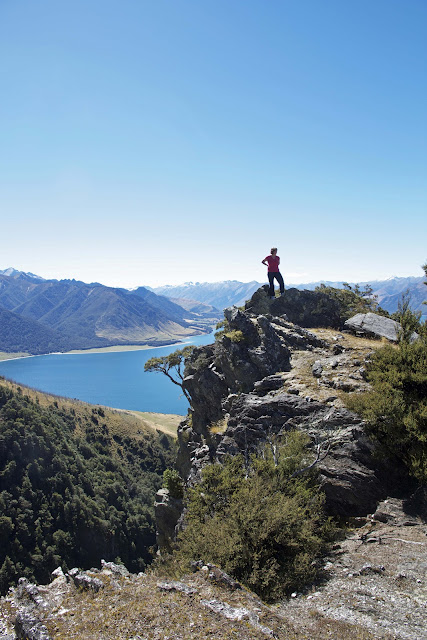“Up there on a fine day is like being surrounded by fields
of gold that fortify and fuel the spirit.”
– Brian Turner*
Otago is
a dangerous place. Stretching from Dunedin to Mount Aspiring in New Zealand’s South Island, its diverse
yet consistently stunning scenery is so compelling that driving can be quite
perilous. How are you supposed to keep your eyes on the road when the province’s wide skies, blue lakes, high
tawny hills and higher slabby mountains keep demanding your attention? Why is
there no tourist guide entitled “Death By Scenery”?!
 |
[Looking across Lake Hawea towards Sentinel Peak] |
And it’s not just drivers who are
endangered. The same scenery seeps into the soul of walkers, climbers, cyclists,
anglers, skiers, kayakers, and all lovers of the outdoors. Whatever the season,
whatever the weather, it never quite stops calling you – be it in a whisper or a shout
– go out, go up!
We’d gone to Lake Hawea in north-west
Otago for some down time. I’ve finally learned not to be surprised at how long it can
take to recover from a big walk. There are aches and pains caused by the toxins
that build up in muscles during exertion. There’s also the inevitable
dehydration, no matter how much you’ve tried to keep up your fluid intake while walking.
And that
diet of freeze-dried meals, dry biscuits and scroggin has its effects too. My
digestive system usually takes a while to recalibrate itself to things fresh,
green and fruity.
Similarly
with my psyche. It too needs time to process all the amazements of a good walk.
We were in
New Zealand for nearly a month. So after our time on Stewart Island and the
Greenstone/Caples Track (see posts here & following), we’d planned a week in a bach
(ie a shack or holiday house) at Lake Hawea to give our bodies and souls some
recovery time. South Islanders say Hawea today is what Wanaka was a few decades
back; a small village with basic facilities in an achingly beautiful lakeside
setting.
And there’s the rub. While I love to
relax, and enjoying reading, going out for coffee, or tucking into the
excellent produce of Otago, after a few days in this setting the siren call of
the hills becomes a banshee wail.
It didn’t help that our bach had superb
views over the lake towards 2,000m mountains. Nor that our bodies were feeling
fit, and wondering where all this indolence was leading. So when the clearest
of blue-skied days arrived, we found ourselves having a “leg stretch”. Isthmus Peak, a mere 1,385m,
seemed a suitably modest target, promising views over both Lake Hawea and Lake
Wanaka.
 |
| [An Australasian Harrier soars over Lake Hawea] |
As we
wound our way towards the tussocky heights, we struck two problems. First there
was some ambiguity about the time the walk would take. Was it 3-4 hours each
way, or 3-4 hours return? We’d only allowed time for the latter. And then we noticed a
small convoy of 4WD vehicles winding up a steep farm track well ahead of us. We
guessed they too were headed for Isthmus Peak. We felt cheated! The thought of
expending all that effort walking, only to arrive at a peak that others had driven to, was galling.
We sat
down for a drink and a think. We had a grandstand view over a high country
stations to the lake and the ranges surrounding it. In the distance, at least a
kilometre below us, a farmer and his dogs were rounding up cattle. We could just
hear him whistling, tooting his ute’s horn and calling, while cows mooed and dogs barked. We
smiled at the idyllic scene: hard and honest labour in a sublime setting. But as
we watched, the farmer suddenly shouted at one of the dogs. In a clearly
audible voice, adding a short Germanic expletive to the word “idiot”, he made it clear he wasn’t impressed with the dog! We
nearly fell off our lofty perches laughing, our bubble of bucolic bliss having
burst.
 |
[A grandstand view over Lake Hawea] |
The
laughter somehow helped us to make up our minds. Rather than going for the
named peak, we would leave the marked track and head straight up towards a
nearer rocky eminence. When I pointed out that it lacked a name, Lynne
helpfully suggested that we could call it “Grants Knob”.
 |
[Looking towards "Grants Knob"] |
More laughter and some lung-heaving work eventually saw
us top out on the newly named “peak”.
“Then the cloud cleared away, the sun came out and we lay in
the tussock grass and ate and drank and talked and laughed. The water turned a
Prussian blue … The world was transformed into deep blues and pale golds,
the robes and heraldry of Central Otago.”
*
While
these words from Otago writer Brian Turner show us we were not the first to
find such a place on such a day, we truly felt that we were. In youth I would
have been restless to “bag” the peak. But now, in a setting like this, going further than
our own private peak would have felt perverse. Now was the kind of time you
would recall for as long as you told tales of wonderful times in wondrous
places.
*
from Brian Turner’s “Into the
Wider World: A Backcountry Miscellany”, Random
House, 2008
No comments:
Post a Comment